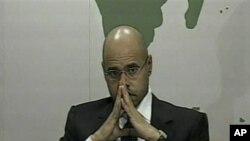The London-based "Islamic Human Rights Commission", a private group which has set as its mission to defend the oppressed, says it condemns the treatment of the protesters in Libya by the Gadhafi regime. VOA’s Peter Clottey spoke to the IHRC’s Mohammed El-Sayed about what is happening in Libya, including his group's investigation of human right abuses and this week's pronouncement by Moammar Gadhafi's son, Saif al-Islam, that his father's government would fight to the "last man, woman and bullet" to stay in power. El-Sayed says there are indications the Gadhafi regime and its supporters are fractured.
|
Listen to our interview with Mohammed El-Sayed:
|
El-Sayed: We’ve got a part of the people quite high up in the regime itself actually turning against it and joining the protesters. We’ve got reports of the interior minister having joined the protesters. The ambassador at the Arab League has done the same thing. He has announced that his position is that of protesters.
We’ve got the cases of ambassadors to separate countries doing the same thing. We had the case yesterday where the Libyan ambassador to India has actually announced his resignation on the BBC, live on television. We also have reports of large sectors of the military joining the protesters. We’ve got the case of the military in the second largest city, Benghazi, [where] they seemed to have actually joined the protesters and they have declared Benghazi to be a liberated city from the regime.
So, in a sense we have got, I think, all of this developments pointing in one direction, where there seems to be consensus among the protesters and many sectors within the government itself. They are reaching the point where, I think, they’re just fed up with forty-two years of this dictatorial regime.
Clottey: With the challenges that your organization faces, how are you about to investigate all of these human right abuses?
El-Sayed: It’s quite difficult initially, because, as you can see, there is a bit of a media blackout, but there are resources which we can rely on, there are people on the ground with whom we can try to get in touch. Obviously, with the ongoing protest it makes it a bit difficult because there is always the potential for people to be arrested, for people to be sometimes even maybe tortured or killed.
In the case of Libya right now, we’ve also got the issue - again it’s similar to what happened previously in Egypt and Tunisia - where they are actually… intentionally shutting down the Internet, shutting down communication services, so as to prevent [protesters] from being able to get the message out.
As I said, Saif al-Islam Gadhafi, in his address, one of the things he focused on and blamed the revolution on was “people abroad operating via the Internet and Facebook.” He actually named Facebook. So, I think, in a sense, it’s a bit of a sign of desperation on the part of the government to really blame the Internet and modern technology.
I think that they are all living in kind of a medieval mentality where they can’t actually deal with these changes which are ongoing new, these technological advances which allow people to actually communicate and get their message out.





